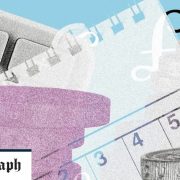The life savings of millions of people could suffer irreparable damage if the second wave of the pandemic causes a stock market crash akin to the severe sell-off in February and March.
Many have had their retirement plans derailed since the start of the virus crisis over concerns that their nest eggs will not recover.
Savers in their 50s found nearly £20,000 knocked off the value of the average £100,000 “defined contribution” pension pot when the stock market hit its lowest point in March, according to figures compiled for Telegraph Money by Quilter, the wealth manager.
The average retirement fund had bounced back to almost £96,000 by the end of October, sustaining losses of just over £4,000 over the course of the year.
Some readers have reported six-figure losses this year, with their investments failing to bounce back.
Andrew Moncreef, 65, from Scotland, said he was horrified when his pension savings plummeted from £240,000 to a low of £146,000 in the spring. He said the pot had grown back to £180,000 but he had had to come to terms with a £60,000 loss. The 65-year-old said he had changed his investments to protect his pension from any further drops after he spoke to a wealth manager.
Another reader said more than £110,000 had been knocked off the value of his self-invested personal pension and Isa accounts. The reader, who is 62 and retired, said he had carefully planned the amount he withdrew every month to last him until he was 90. “The losses have wiped five years off,” he said. “It means I have to die at 85 now if I don’t want to run out of money.”
Pension pots shrink
However, there are fears that the worsening economic outlook under a second lockdown could prompt another devastating stock market tumble.
The markets have had a roller coaster year and the ride is likely to be far from over as investors continue to grapple with a stop-start economy, a global pandemic, unresolved Brexit negotiations and the aftermath of a razor-tight US election.
In October, London’s largest companies recorded their worst month since March as the FTSE 100 index lost 4.9pc. The index suffered its worst week since June at the end of last month, when £72bn was wiped off its total value.
Richard Hunter of Interactive Investor, a fund shop, said the “damage has already been done” for British investors, regardless of the second lockdown. He said the outlook remained “as uncertain as ever”.
Ask Kate a question | The Telegraph’s pensions doctor
Luckily, there are several ways to protect your pension savings.
Jon Greer of Quilter said it was crucial to stay invested and avoid panic, as investors could be their own worst enemy in times of strife.
He said: “There can be a temptation when markets fall to flee into cash. But while a portfolio may be worth less at today’s prices than it was perhaps just a few weeks ago, those losses aren’t locked in until the assets are sold.” If you stay invested, there is an opportunity for them to recover.
Pensioners should also avoid taking out large sums from their investment pot when markets are depressed, because such withdrawals disproportionately reduce the pot’s overall size and could quickly erode their savings.
Dipping into a pension as markets fall means more shares have to be sold to make up the amount being taken out. This means fewer shares are owned when markets rise, which limits the scope for recovery.
Those who make regular withdrawals should consider reducing their income to protect the longevity of their savings. For example, a retired person with £100,000 may have been taking 4pc a year, a common benchmark, but if their pot has fallen to £75,000, their income falls in proportion.
Confidence levels for retirement
Mr Greer said: “To reduce the risk of ruin, they could keep their withdrawal rate fixed at 4pc, although this would see the income from their pension drop to £3,000 a year.”
Those who want to restore the value of their pension could top it up. Many choose to invest when share prices are depressed in the hope they can get a bargain and prices will bounce back.
Anyone about to retire may consider prolonging their career or phasing in retirement more gradually. This would remove any immediate worries about cashing in investments to generate income during a market dip.
Many savers have been forced to reassess their plans and retirement goals this year: one in eight of those aged 45 or over said they have had to make changes, according to a study by Moneyfarm, an investment service.
























Comments